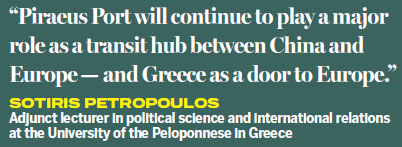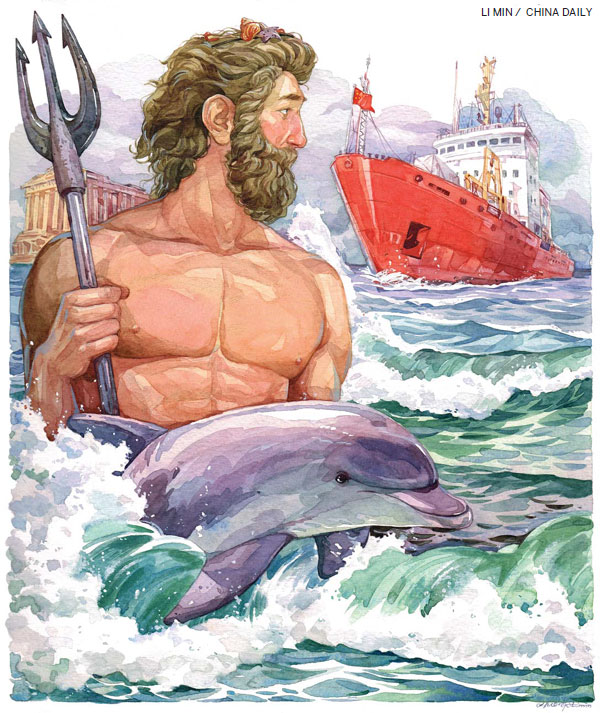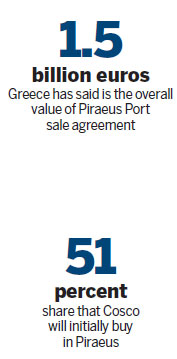Passage to piraeus
Updated: 2016-04-15 08:52
By Maria Petrakis in Athens and Lyu Chang in Beijing(China Daily Europe)
|
|||||||||
Cosco navigates witches, dragons and heroes to harness ancient Greek port and link it to Belt and Road Initiative
On a sunny Friday in the Greek capital, politicians, shipowners, bankers and diplomats were celebrating the sale of Piraeus Port, the nation's ancient harbor, to another ancient nation, China.
Xu Lirong, chairman of China Cosco Shipping Corporation Limited, known as Cosco, extolled the benefits of the deal he had just signed with Greek Prime Minister Alexis Tsipras in a 19-century exhibition hall and, referring to one of the most ancient Greek tales, says Piraeus can recover the Golden Fleece.

Getting to this day, April 8, may have seemed to the Chinese a journey as fraught with peril and danger as in the ancient tale of Jason and the Argonauts, where the hero Jason dodges dragons whose teeth sow warriors and marries a sorceress to reclaim the Golden Fleece and his birthright, a throne.
But for the Chinese, Piraeus is more of a dragon's head - an emblem of power and leadership - than a dragon's tooth. Buying a majority stake in Piraeus Port, which the Chinese have already made one of the fastest-growing harbors in the world, ensures control over a key thoroughfare in the plan to recreate a commercial empire pumping Chinese goods throughout the continent, as well as trade heading for China.
For Cosco, Piraeus is the point at which China nudges into Europe as part of President Xi Jinping's vision of the Belt and Road Initiative, a modern-day Silk Road, as China's gateway to Europe.
Since the Chinese shipping behemoth agreed to take over container operations at two piers in Piraeus in 2008, traffic has surged at Greece's biggest harbor.
Piraeus, Xu says, will become the Mediterranean's largest container transit port, the international logistics distribution center of the eastern Mediterranean, and the southern gate of Central and Eastern Europe, and the Balkans.
Chinese money will be invested to restore ship repair facilities, boost jobs and provide key support to the booming cruise terminal business.
Greece has said the overall value of the agreement is about 1.5 billion euros ($1.71 billion), including investments, dividends and income from an existing concession agreement. Cosco will initially buy a 51 percent stake in Piraeus for 280.5 million euros and the additional stake in the next five years for 88 million euros after further investments.
That is already the Golden Fleece for Greece, says Sotiris Petropoulos, adjunct lecturer in political science and international relations at the University of the Peloponnese in Greece. Becoming a transit hub for EU-East Asia trade will help put the country back on the path to sustainable development and free it from public debt.
"Cosco, one of the largest container shippers and handlers in the world, will now be even more involved in the Greek transport networks," he says. "Piraeus Port will continue to play a major role as a transit hub between China and Europe - and Greece as a door to Europe."
Piraeus' relatively short distance from the main Mediterranean maritime route allows it to act as both a transshipment hub and gateway, according to a 2012 report by consultants McKinsey & Co, which said the country could transform itself into a regional cargo and logistics center as part of a 10-year plan.
There is serious Chinese interest in a plan to build a major freight and logistics center on the Thriasio plain, an expanse that's been described as the industrial backyard of Athens.
Related Stories
COSCO buys stake in big Greek port 2016-04-12 08:59
COSCO's acquisition of Greek Piraeus Port to further contribute to local economy 2016-04-11 11:02
COSCO orders 10 VLOCs from CSSC 2016-04-01 11:12
China COSCO, Vale sign agreement on iron ore shipping 2016-03-19 13:29
COSCO set to reshape shipping alliances 2016-02-27 10:06
Today's Top News
Embryos growing in space a 'giant leap'
Russia to defend regional security jointly with China
Passage to piraeus
In the hall of the great frescoes
World Bank joins AIIB on financing for joint projects
GM seeds to get oversight
Russia-China ties benefit both countries, peoples
China, UK showcase best books in London
Hot Topics
Lunar probe , China growth forecasts, Emission rules get tougher, China seen through 'colored lens', International board,
Editor's Picks

|

|

|

|

|

|









